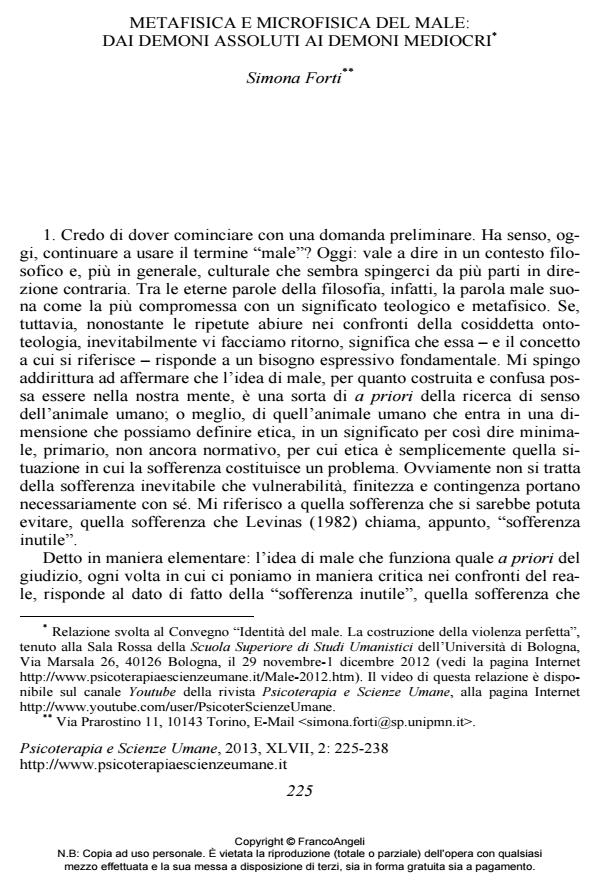Metaphysics and microphysics of evil: From absolute demons to mediocre demons
Journal title PSICOTERAPIA E SCIENZE UMANE
Author/s Simona Forti
Publishing Year 2013 Issue 2013/2 Language Italian
Pages 14 P. 225-238 File size 154 KB
DOI 10.3280/PU2013-002006
DOI is like a bar code for intellectual property: to have more infomation
click here
Below, you can see the article first page
If you want to buy this article in PDF format, you can do it, following the instructions to buy download credits

FrancoAngeli is member of Publishers International Linking Association, Inc (PILA), a not-for-profit association which run the CrossRef service enabling links to and from online scholarly content.
Two different ways of thinking political evil are contrasted and named, respectively, (i) "Dostoyevsky paradigm" and (ii) "mediocre demons paradigm". Will, omnipotence, and nothingness: although no longer framed in Dostoyevsky’s religious outlook, the correlation between these three terms has been reworked by later philosophers, who continue to think of evil as a result of perversion of will in omnipotence, and of a sovereign subject - whether collective or individual - which, by raising itself up to everything, creates nothingness. It is argued that now is the time to abandon this approach and focus on the paradigm of "mediocre demons". Following this direction, it should become clear that evil is a system, in the sense of a tangle of subjectivities, a network of relations, whose threads knit together thanks to a perfect complementarity. Thinking within the paradigm of "mediocre demons" means primarily questioning the exclusive role of the will and desire for death, and viewing instead the scenes of evil as powerfully inhabited by the will to life, as the result of the attempt to maximize life itself.
Keywords: Political evil, Dostoyevsky paradigm, mediocre demons paradigm, desire for death, omnipotence, will to life
- Arendt H. (1963). Eichmann in Jerusalem. A Report on the Banality of Evil. New York: Penguin (trad. it.: La banalità del male. Eichmann a Gerusalemme. Milano: Feltrinelli, 1964).
- Arendt H. (1978). The Life of the Mind. New York: Harcourt Bruce Jovanovich (trad. it.: La vita della mente. Bologna: Il Mulino, 1987).
- Bernstein R.J. (2002). Radical Evil. A Philosophical Interrogation. Cambridge, MA: Polity Press
- Deleuze G. & Guattari F. (1991). Qu’est-ce que la philosophie? Paris: Minuit (trad. it.: Che cos’è la filosofia? Torino: Einaudi, 1996).
- Dostoevkij F. (1873). I demoni. Torino: Einaudi, 1965
- Dostoevskij F. (1878-80). I fratelli Karamazov. Torino: Einaudi, 1970; Milano: Garzanti, 1984.
- Esposito R. (2007). Terza persona. Politica della vita e filosofia dell’impersonale. Torino: Einaudi
- Forti S. (2012). I nuovi demoni. Ripensare oggi male e potere. Milano: Feltrinelli.
- Foucault M. (1981-82). L’herméneutique du sujet. Paris: Gallimard, 2001 (trad. it.: L’ermeneutica del soggetto. Corso al Collège de France, 1981-1982). Milano: Feltrinelli, 2003).
- Foucault M. (1984). Le courage de la vérité. Le Gouvernement de soi et des autres, II. Cours au Collège de France, 1984. Paris: Gallimard, 2009 (trad. it.: Il coraggio della verità. Il governo di sé e degli altri. II. Corso al Collège de France, 1984. Milano: Feltrinelli, 2011).
- Havel V. (1978). Moc bezmoenych (trad. it.: Il potere dei senza potere. Bologna: Centro Studi Europa Orientale, 1979; Milano: Garzanti, 1985).
- Heidegger M. (1945). Colloquio serale in un campo di prigionia in Russia tra un prigioniero più giovane ed uno più anziano. In: Colloqui su un sentiero di campagna, 1944-45. Genova: Il Melangolo, 2007).
- Jullien F. (2004). L’ombre au tableau. Du mal ou du negatif. Paris: Seuil (trad. it.: L’ombra del male. Il negativo e la ricerca di senso nella filosofia europea e nel mondo cinese. Costabissara [VI]: A. Colla, 2005).
- Kant I. (1793). La religione nei limiti della semplice ragione. In: Scritti morali. Torino: UTET, 1970
- Lacan J. (1959-60). Le seminaire de Jacques Lacan. 7: L’ethique de la psychanalyse: 1959- 1960. Paris: Seuil, 1986 (trad. it.: Il seminario. Libro VII. L’etica della psicoanalisi: 1959- 1960. Torino: Einaudi, 1994).
- Levi P. (1986). I sommersi e i salvati. Torino: Einaudi
- Levinas E. (1978). Transcendance et Mal. Le Nouveau Commerce, 41: 55-75. Anche in: De Dieu qui vient à l’idée. Paris: Vrin, 1982 (trad. it.: Trascendenza e male. In: Di Dio che viene all’idea. Milano: Jaca Book, 1983).
- Levinas E. (1982). La souffrance inutile. In: Entre nous. Paris: Éditions Grasset & Fasquelle, 1991, pp. 100-112 (trad. it.: Sofferenza inutile. In: Tra noi. Saggi sul pensare-all’altro. Milano: Jaca Book, 1998).
- Milgram S. (1974). Obedience to Authority: An Experimental View. New York: Harper & Row (trad. it.: Obbedienza all’autorità. Milano: Bompiani, 1975; Torino: Einaudi, 2003).
- Nancy J.-L. (1983). La communauté désoeuvrée. Paris: Christian Bourgois (trad. it.: La comunità inoperosa. Napoli: Cronopio, 1992).
- Nietzsche F. (1884). Der Wille zur Macht. Leipzig: Alfred Kröner (trad. it.: La volontà di potenza. Frammenti postumi. Milano: Bompiani, 1992).
- Patočka J. (1975). Kacirske eseje o filosofii dejin (trad. it.: Saggi eretici sulla filosofia della storia. Bologna: Centro Studi Europa Orientale, 1981; Torino: Einaudi, 2008).
- Zamperini A. (2004). Prigioni della mente. Relazioni di oppressione e resistenza. Torino: Einaudi
- Zimbardo P. (1989). Quiet Rage. The Stanford Prison Study Video. Stanford, CA: Stanford University Press
- Zimbardo P. (2007). The Lucifer Effect. New York: Random House (trad. it.: L’effetto Lucifero. Cattivi si diventa? Milano: Raffaello Cortina, 2008).
Simona Forti, Metafisica e microfisica del male: dai demoni assoluti ai demoni mediocri in "PSICOTERAPIA E SCIENZE UMANE" 2/2013, pp 225-238, DOI: 10.3280/PU2013-002006